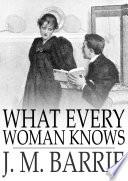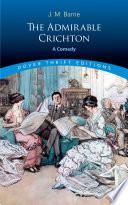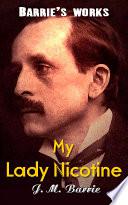“I'm not young enough to know everything.”
J. M. Barrie The Admirable Crichton, Act I (1903)
The Admirable Crichton (1903)
Sir James Matthew Barrie, 1st Baronet, was a Scottish novelist and playwright, best remembered today as the creator of Peter Pan. He was born and educated in Scotland and then moved to London, where he wrote a number of successful novels and plays. There he met the Llewelyn Davies boys, who inspired him to write about a baby boy who has magical adventures in Kensington Gardens , then to write Peter Pan, or The Boy Who Wouldn't Grow Up, a "fairy play" about an ageless boy and an ordinary girl named Wendy who have adventures in the fantasy setting of Neverland.
Although he continued to write successfully, Peter Pan overshadowed his other work, and is credited with popularising the name Wendy. Barrie unofficially adopted the Davies boys following the deaths of their parents. Barrie was made a baronet by George V on 14 June 1913, and a member of the Order of Merit in the 1922 New Year Honours. Before his death, he gave the rights to the Peter Pan works to Great Ormond Street Hospital for Children in London, which continues to benefit from them.
Wikipedia

“I'm not young enough to know everything.”
J. M. Barrie The Admirable Crichton, Act I (1903)
The Admirable Crichton (1903)
“We never understand how little we need in this world until we know the loss of it.”
Source: Margaret Ogilvy (1897), Ch. 8
“Do you believe in fairies?... If you believe, clap your hands!”
Act IV
Peter Pan (1904)
Source: The Little White Bird (1902), Ch. 26
Act I
What Every Woman Knows (1908)
Source: Peter and Wendy (1911), Ch. 1
Context: Occasionally in her travels through her children's minds Mrs. Darling found things she could not understand, and of these quite the most perplexing was the word Peter. She knew of no Peter, and yet he was here and there in John and Michael's minds, while Wendy's began to be scrawled all over with him. The name stood out in bolder letters than any of the other words, and as Mrs. Darling gazed she felt that it had an oddly cocky appearance.
"Yes, he is rather cocky," Wendy admitted with regret. Her mother had been questioning her.
“All children, except one, grow up.”
Source: Peter and Wendy (1911), Ch. 1
Context: All children, except one, grow up. They soon know that they will grow up, and the way Wendy knew was this. One day when she was two years old she was playing in a garden, and she plucked another flower and ran with it to her mother. I suppose she must have looked rather delightful, for Mrs. Darling put her hand to her heart and cried, "Oh, why can't you remain like this for ever!" This was all that passed between them on the subject, but henceforth Wendy knew that she must grow up. You always know after you are two. Two is the beginning of the end.
Source: Peter and Wendy (1911), Ch. 17
Context: As you look at Wendy, you may see her hair becoming white, and her figure little again, for all this happened long ago. Jane is now a common grown-up, with a daughter called Margaret; and every spring cleaning time, except when he forgets, Peter comes for Margaret and takes her to the Neverland, where she tells him stories about himself, to which he listens eagerly. When Margaret grows up she will have a daughter, who is to be Peter's mother in turn; and thus it will go on, so long as children are gay and innocent and heartless.
Source: The Little White Bird (1902), Ch. 22
Source: The Little White Bird (1902), Ch. 16
And if David asks why I decline, I explain that it is because I have no desire to meet the woman.
"Come this time, father," he urged lately, "for it is her birthday, and she is twenty-six," which is so great an age to David, that I think he fears she cannot last much longer.
Source: The Little White Bird (1902), Ch. 1
Source: The Little White Bird (1902), Ch. 14
Context: If you ask your mother whether she knew about Peter Pan when she was a little girl she will say, "Why, of course, I did, child," and if you ask her whether he rode on a goat in those days she will say, "What a foolish question to ask; certainly he did." Then if you ask your grandmother whether she knew about Peter Pan when she was a girl, she also says, "Why, of course, I did, child," but if you ask her whether he rode on a goat in those days, she says she never heard of his having a goat. Perhaps she has forgotten, just as she sometimes forgets your name and calls you Mildred, which is your mother's name. Still, she could hardly forget such an important thing as the goat. Therefore there was no goat when your grandmother was a little girl. This shows that, in telling the story of Peter Pan, to begin with the goat (as most people do) is as silly as to put on your jacket before your vest.
Of course, it also shows that Peter is ever so old, but he is really always the same age, so that does not matter in the least.
Then if you ask your grandmother whether she knew about Peter Pan when she was a girl, she also says, "Why, of course, I did, child," but if you ask her whether he rode on a goat in those days, she says she never heard of his having a goat. Perhaps she has forgotten, just as she sometimes forgets your name and calls you Mildred, which is your mother's name. Still, she could hardly forget such an important thing as the goat. Therefore there was no goat when your grandmother was a little girl. This shows that, in telling the story of Peter Pan, to begin with the goat (as most people do) is as silly as to put on your jacket before your vest.
Of course, it also shows that Peter is ever so old, but he is really always the same age, so that does not matter in the least.
Source: The Little White Bird (1902), Ch. 14
“Just always be waiting for me, and then some night you will hear me crowing.”
Source: Peter and Wendy (1911), Ch. 17
Context: The last thing he ever said to me was, "Just always be waiting for me, and then some night you will hear me crowing."
“One's religion is whatever he is most interested in, and yours is Success.”
The Twelve-Pound Look (1910)
Source: Peter and Wendy (1911), Ch. 17
Source: The Little Minister (1891), Ch. 1 : The Love-Light
Context: The gladness of living was in your step, your voice was melody, and he was wondering what love might be.
You were the daughter of a summer night, born where all the birds are free, and the moon christened you with her soft light to dazzle the eyes of man. Not our little minister alone was stricken by you into his second childhood. To look upon you was to rejoice that so fair a thing could be; to think of you is still to be young.
“It is of another minister I am to tell, but only to those who know that light when they see it.”
Source: The Little Minister (1891), Ch. 1 : The Love-Light
Context: "They didna speak, but they just gave one another a look, and I saw the love-light in their een." No more is remembered of these two, no being now living ever saw them, but the poetry that was in the soul of a battered weaver makes them human to us for ever.
It is of another minister I am to tell, but only to those who know that light when they see it. I am not bidding good-bye to many readers, for though it is true that some men, of whom Lord Rintoul was one, live to an old age without knowing love, few of us can have met them, and of women so incomplete I never heard.
“They didna speak, but they just gave one another a look, and I saw the love-light in their een.”
Source: The Little Minister (1891), Ch. 1 : The Love-Light
Context: "They didna speak, but they just gave one another a look, and I saw the love-light in their een." No more is remembered of these two, no being now living ever saw them, but the poetry that was in the soul of a battered weaver makes them human to us for ever.
It is of another minister I am to tell, but only to those who know that light when they see it. I am not bidding good-bye to many readers, for though it is true that some men, of whom Lord Rintoul was one, live to an old age without knowing love, few of us can have met them, and of women so incomplete I never heard.
Source: The Little Minister (1891), Ch. 3 : The Night-Watchers
Context: Your heart is as fresh as your face; and that is well. The useless men are those who never change with the years. Many views that I held to in my youth and long afterwards are a pain to me now, and I am carrying away from Thrums memories of errors into which I fell at every stage of my ministry. When you are older you will know that life is a long lesson in humility.
Source: Margaret Ogilvy (1897), Ch. 10
“Never ascribe to an opponent motives meaner than your own.”
Rectorial Address, St. Andrew's (3 May 1922)
Source: The Little Minister (1891), Ch. 24 : The New World, and the Woman Who May Not Dwell Therein
Source: Peter and Wendy (1911), Ch. 6
Often paraphrased as: Always be a little kinder than necessary.
Source: The Little White Bird (1902), Ch. 4
Source: The Little Minister (1891), Ch. 1 : The Love-Light
Source: The Little Minister (1891), Ch. 1 : The Love-Light
“Those who bring sunshine into the lives of others cannot keep it from themselves.”
As quoted in Christ's Second Coming Fulfilled (1917) by Marion Morris, p. 144
Source: The Little Minister (1891), Ch. 26 : Scene at the Spittal
Source: Peter and Wendy (1911), Ch. 17
Source: The Little White Bird (1902), Ch. 14
“There are few more impressive sights in the world than a Scotsman on the make.”
Act II
What Every Woman Knows (1908)
Source: The Little White Bird (1902), Ch. 16
Act I
The Admirable Crichton (1903)
Source: Peter and Wendy (1911), Ch. 13
Source: Margaret Ogilvy (1897), Ch. 10
“Proud and insolent youth, prepare to meet thy doom.”
Act V
Peter Pan (1904)
“Do you know why swallows build in the eaves of houses? It is to listen to the stories.”
Act I
Peter Pan (1904)
“Second to the right and then straight on till morning.”
Act I
Peter Pan (1904)


